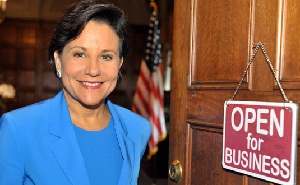 Representatives from Cuba and the United States met today in Havana to discuss the impact and limitations of recent measures taken by the U.S. government modifying certain aspects of the blockade. The encounter also saw the participation of U.S. Secretary of Commerce, Penny Pritzker, who arrived in Cuba, yesterday, October 6, on a work visit to the country.
Representatives from Cuba and the United States met today in Havana to discuss the impact and limitations of recent measures taken by the U.S. government modifying certain aspects of the blockade. The encounter also saw the participation of U.S. Secretary of Commerce, Penny Pritzker, who arrived in Cuba, yesterday, October 6, on a work visit to the country.
”These talks are about learning how to turn theoretical opportunities into reality,” stated Pritzker, the second high-level official of the Obama administration to visit Cuba, following Secretary of State John Kerry’s recent visit to the island.
Participating in the meeting were officials from the U.S. Treasury, Commerce and State departments and representatives from various Cuban ministries and entities.
The U.S. Secretary of Commerce stated that among other objectives, Barack Obama’s policy aims “to help Cubans insert themselves into the global economy,” as well as giving U.S. citizens the opportunity to get to know Cuba and familiarize themselves with an island located only 90 miles from its coasts.
She noted that the situation is not expected to “change overnight,” adding that the impact of the measures will also depend on actions taken by the Cuban government.
“My hope is that this week will be the first of a series of meetings in which we help one another understand the other’s systems,” she concluded.
For his part Rodrigo Malmierca, Cuban minister of Foreign Trade and Investment, stated that the blockade continues to be the main obstacle to advancing the process of normalization of relations between the two countries.
Malmierca noted that he hoped that the Secretary of Commerce’s visit would serve to bring the two countries closer together, so that they might know each other better and progress along the path chosen by the two nations.
He added that normalization of relations will be no easy task, given the persistence of many pending differences and problems which must be resolved.
Malmierca highlighted however, that both parties have shown a clear willingness to continue advancing in this process.
He also recognized the measures recently taken by Obama to modify aspects of the blockade policy, but noted that they continue to be insufficient, while work must continue to eliminate the blockade in its entirety.
This past January the Obama administration announced a group of measures modifying certain aspects of the blockade, mainly in regards to travel, trade and some sectors of the national economy and telecommunications.
A broadening of these policies was announced in September; however the basic blockade policy remains intact.
Cuban authorities have noted the limited nature of the measures, as well as the fact that they are geared toward specific sectors and not all of Cuban society.
They have also stated that many of the measures contain elements which make them inapplicable.
In this sense, they have highlighted that allowing Cuba to use the dollar in international trade, as well as awarding the country credit for a range of purchases, are fundamental elements to achieving the first steps on the road toward normalization.
Pritzker arrived in Havana yesterday, October 6, and toured the Mariel Container Terminal, as well as new warehouse and logistical support facilities located at the site.
Her visit, which concludes today, October 7, includes meetings with Cuban officials and tours of other centers of economic and cultural interest.
(Sergio Alejandro Gómez, Granma)